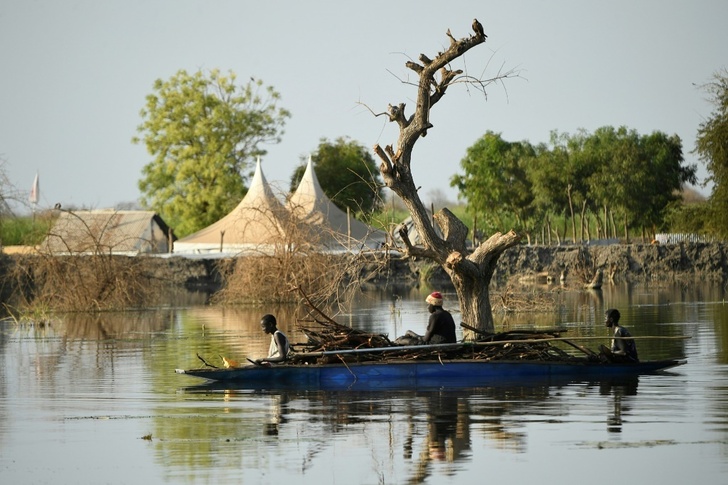Nearly a quarter of South Sudan's population has been affected by years of unprecedented flooding, according to a report Tuesday by the UN Development Programme and the government's relief and rehabilitation commission.
Four straight years of flooding have impacted more than 2.6 million people across the world's newest nation, forcing many to turn to wild fruits and leaves for sustenance, the report said.
"Roads and bridges have been washed away, health facilities abandoned or destroyed, crops and pastures submerged under water, families destroyed and parents separated from their children," the commission's chairman Manase Lomole Waya said.
The floods also led to the deaths of 172 people caught by rising waters, the report said.
"The affected people and communities are mainly relying on support of relatives and friends, fishing, eating wild fruits and leaves, selling animals, as well as the limited humanitarian assistance supplied," it said.
The annual floods since 2019 -- a recent phenomenon that many experts link to climate change -- have turned 10 percent of the country's arable land to swamp at a time when two out of three South Sudanese do not have enough to eat.
The country has already had to grapple with deadly conflict, natural disasters, economic malaise and relentless political infighting since winning independence from Sudan in 2011.
Since then it has spent more than half its existence at war, with nearly 400,000 people dying during a five-year civil conflict that ended in 2018.
Last November, the United Nations warned that around two-thirds of South Sudan's population of 11 million people were at risk of severe hunger, surpassing levels seen even during the conflict in 2013 and 2016.
The UN blamed the humanitarian disaster on a combination of violence, poor macroeconomic conditions, extreme climate events and spiralling costs of food and fuel, as well as a decline in funding for aid programmes.
Four out of five in South Sudan live in "absolute poverty", according to World Bank figures for 2018.
Although a 2018 ceasefire and power-sharing deal between President Salva Kiir and his deputy Riek Machar still largely holds, little progress has been made in fulfilling its terms.
The country remains one of the world's poorest despite large oil reserves, and its leadership has drawn fierce criticism from the UN for stoking violence and failing to improve living conditions for its people.
str/amu/js
© Agence France-Presse
Your content is great. However, if any of the content contained herein violates any rights of yours, including those of copyright, please contact us immediately by e-mail at media[@]kissrpr.com.
Source: Story.KISSPR.com

